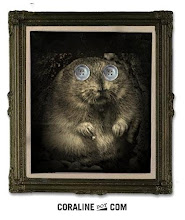The following is written about Ishmael Reed's Mumbo Jumbo. It addressed the question: "One critic writing about Mumbo Jumbo calls it a "de-centered" text. One example of this is that it is often hard to figure out who is speaking. In what other ways is this quality reflected in the book? Why do you think Reed uses this method? Analysis and examples, please!"
Thanks to the lovely website http://www.glbtq.com I came across the following quote that seems to help address this issue perfectly.
Linda Hutcheon describes the intellectual goal of post-modernism as to erode our assumptions by examining them, "to de-naturalize some of the dominant features of our way of life; to point out that those entities that we unthinkingly experience as 'natural' (they might even include capitalism, patriarchy, liberal humanism) are in fact 'cultural'; made by us, not given to us," so that post-modernism "provokes an investigation of how we make meaning in culture."
This pretty clearly describes what we are looking at when we read Mumbo Jumbo. Reed has turned the world upside down with this novel. He breaks enough literary conventions that we are forced to really examine his work in order to pull some meaning from it. Reed switches tense, voice, and even location without a moment's notice. There is none of Aristotle's precious unity of time, place, and action to be found among these pages.
Not only has Reed made the novel challenge the current standards of writing, but as Hutcheon states above, he has challenged the notions of everything we are conditioned to think of as natural. We see Reed refusing to tip-toe around difficult race relations. The interactions in chapter 23 demonstrate the people of all races can work together, but people of every color can still come to the consensus that whites cannot be trusted (82-89). Attention is drawn to the fact that members of this alleged elite hegemony will commit murder and cover it up rather than allow the marginalized one more step up the ladder (95). Reed even shows us a black woman with a white maid (103)!
On the surface perhaps, the book addresses religion and politics of the Western world, but it does so much more than that - it tears it apart so the reader has to try and rebuild it. That is the point of de-centering the text, after all - to prove that these things are ultimately just constructs. Reed even forces us to consider one of the lesser used definitions of politics. The last definition Merriam-Webster offers for politics is “the total complex of relations between people living in society”, and even better, the website www.die.net offers as a definition “social relations involving authority or power”. It is this last definition that Reed makes us focus on. The politics of the book are not confined to party lines – religion is politics, dancing is politics, love is politics, New York is politics, history is politics, but it is perhaps most important to note that ALL of this is being challenged because a group of marginalized people are showing some autonomy and shaking up the status quo. That, ladies and gentlemen, is how every action these people take becomes politics – it all involves which group will ultimately end up with the power and control.
Similarly, Reed challenges our notions of religion by creating Jes Grew as a “religion”. It is not Christianity or Judaism, but it is something the people can rally behind, have faith in, and use as a means of keeping their spirits up in hard times. Isn’t that what most other organized religions give us? The hegemonic beliefs on religion are challenged more than that though. Early on we see Abdul switching off and on his “religion” when people are watching: “Abdul sees that the doorway is empty. Deprived of an audience, he changes his demeanor” (36). Reed introduces the Hierophant who confuses matters by being a symbol of corrupt religion. We see what looks like a genuine case of possession (126 -129). And as if we needed more cause to question everything we believe to be true about religion, we meet “3 deacons accompanying Rev. Jefferson” (142) who seem to be some play on upstanding southern Christian men being told to “bust him up. It ain’t no use to planting potatoes when it’s hog-killing time” (142).
These twisted, unexpected, de-centered lines of politics, religion, race, power, and corruption cause us to see clearly how carefully constructed this world must be. People are meddling in the election, trying to put “their man” in to maintain the balance of things. Entire publications are created to spread false messages to people. The end result of it all is that the reader cannot possibly piece together what is really happening at any moment. We must try to tease apart whatever scraps we can and then stitch them together to form our own construct of the truth. In doing so, we hopefully examine our own world a little closer and discover that societal power, organized religion, pop culture, and racial stereotypes are all carefully built by the people who have the power to begin with.

No comments:
Post a Comment